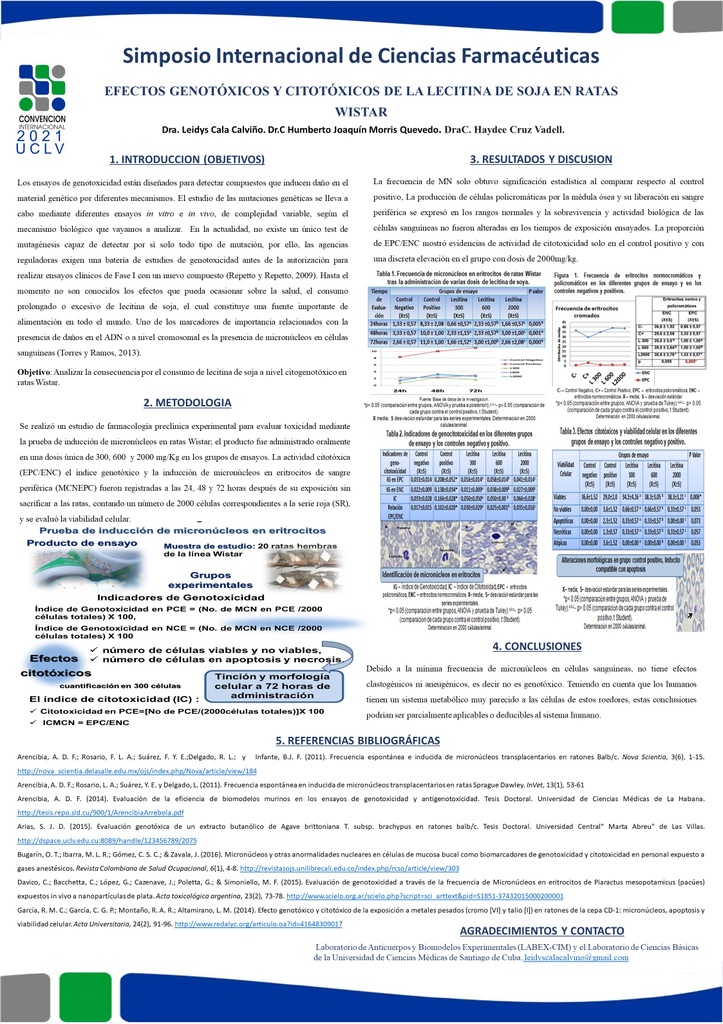Executive Secretary

Simposio Internacional de Ciencias Farmaceúticas
SICF

Abstract
Introduction: Genotoxicity assays are designed to detect compounds that directly or indirectly induce damage to genetic material by different mechanisms.
Objective: To analyze the consequence of the consumption of soy lecithin at the cytogenotoxic level in Wistar rats.
Method: An experimental preclinical pharmacology study was carried out to evaluate toxicity by means of the micronucleus induction test in Wistar rats; the product was administered orally in a single dose of 300, 600 and 2000 mg / Kg in the test groups. Cytotoxic activity (EPC / ENC), genotoxic index and micronucleus induction in peripheral blood erythrocytes (MCNEPC) were recorded at 24, 48 and 72 hours after exposure without sacrificing the rats, counting a number of 2000 cells. corresponding to the red series (SR), and cell viability was evaluated.
Results: The frequency of MN only obtained statistical significance when comparing with the positive control, The production of polychromatic cells by the bone marrow and its release in peripheral blood was expressed in the normal ranges and the survival and biological activity of the blood cells were not altered in the exposure times tested to the different doses of lecithin. The EPC / ENC ratio showed evidence of cytotoxicity activity only in the positive control and with a slight elevation in the group with doses of 2000mg / kg.
Conclusions: Due to the minimum frequency of micronuclei in blood cells, it does not have clastogenic or aneuggenic effects, that is, it is not genotoxic.
Resumen
Introducción: Los ensayos de genotoxicidad están diseñados para detectar compuestos que inducen daño en el material genético por diferentes mecanismos.
Objetivo: Analizar la consecuencia por el consumo de lecitina de soja a nivel citogenotóxico en ratas Wistar.
Método: Se realizó un estudio de farmacología preclínica experimental para evaluar toxicidad mediante la prueba de inducción de micronúcleos en ratas Wistar; el producto fue administrado oralmente en una dosis única de 300, 600 y 2000 mg/Kg en los grupos de ensayos. La actividad citotóxica (EPC/ENC) el índice genotóxico y la inducción de micronúcleos en eritrocitos de sangre periférica (MCNEPC) fueron registradas a las 24, 48 y 72 horas después de su exposición sin sacrificar a las ratas, contando un número de 2000 células correspondientes a la serie roja (SR), y se evaluó la viabilidad celular.
Resultados: La frecuencia de MN solo obtuvo significación estadística al comparar respecto al control positivo, La producción de células policromáticas por la médula ósea y su liberación en sangre periférica se expresó en los rangos normales y la sobrevivencia y actividad biológica de las células sanguíneas no fueron alteradas en los tiempos de exposición ensayados. La proporción de EPC/ENC mostró evidencias de actividad de citotoxicidad solo en el control positivo y con una discreta elevación en el grupo con dosis de 2000mg/kg.
Conclusiones: Debido a la mínima frecuencia de micronúcleos en células sanguíneas, no tiene efectos clastogénicos ni aneugénicos, es decir no es genotóxico.
About The Speaker

Dr. Leidys Cala Calviño

